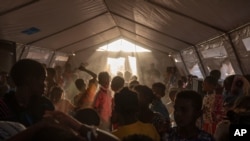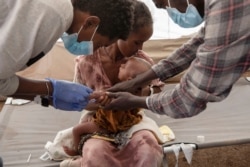The United Nations refugee agency reports fewer Ethiopian refugees are arriving in eastern Sudan because of the many obstacles they encounter while trying to flee the conflict in Ethiopia’s Tigray region.
In the weeks following the Ethiopian government’s November 4 military assault on Tigray, thousands of refugees were crossing the border every day. However, over the past week, the UNHCR says fewer than 500 a day have been arriving.
UNHCR spokesman Babar Baloch said some are coming from deeper inside Tigray, and they arrive weak and exhausted after a long two-week trek to the border.
“Ethiopian refugees who are coming into eastern Sudan are telling us they are being robbed. They tell us about armed groups that they have to evade, increasing checkpoints, hiding in the bushes. Many more could be on the run, but we just do not have a clear picture,” he said.
The United Nations recently learned that four aid workers — three from the Danish Refugee Council and one from the International Rescue Committee — were killed in the fighting in Tigray last month. Communications have been cut off in the region since the start of the conflict, so details about the killings are unclear.
U.N. humanitarian chief Mark Lowcock tweeted Friday that he was saddened and outraged by the killing of the four humanitarians. He also said all parties in the Tigray conflict must respect international humanitarian law.
'Desperate situation'
Baloch said the UNHCR continues to be worried about the safety and condition of some 96,000 Eritrean refugees in Tigray. Unfortunately, he said, the Ethiopian government still has not granted aid agencies access to either the civilians or Eritrean refugees caught in the conflict.
“Supplies are ready to go pending the finalization of the security assessment,” he said. “People on the ground after a monthlong cutoff from humanitarian relief must be in a desperate situation and it is imperative that we reach them as early as possible.”
The UNHCR and partners are calling on all sides involved in the conflict to allow freedom of movement to civilians seeking safety either inside Ethiopia or in bordering countries of refuge.
A total of nearly 50,000 Ethiopian refugees have crossed into Sudan since the assault began, according to the U.N.







